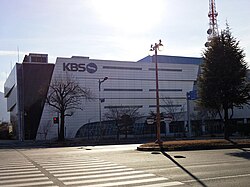Korean Broadcasting System
The Korean Broadcasting System (KBS;
Korean Broadcasting System Media
KBS Cool FM Radio studios
KBS regional broadcasting station in Changwon
Hangul: 한국방송공사; Hanja: 韓國放送公社; RR: Han-guk Bangsong Gongsa; MR: Han’guk Pangsong Kongsa) is one of the biggest South Korean television networks. It was established in 1927. KBS headquarters are in the Yeouido district of Seoul.
The purposes of KBS can be divided into 3 parts.
- Making good broadcasting culture
- Creating national culture
- Globalization of Korean culture
History
KBS started the country's first radio broadcasting service in 1927 as Kyeongseong Broadcasting Corporation (JODK). After liberation, it changed the name to Seoul Central Broadcasting Station in 1947. It launched Korea's first television broadcasting service in 1961.
A system of public broadcasting was established in 1973. For reinforcement of public management, 1TV and Radio1 have not run a commercial since October 1994. First broadcasting HD programs in 2001, KBS completely changed to digital broadcasting in 2012. There are 18 regional stations and 11 overseas branches. There are eight subsidiary companies such as KBSN, KBS Business and KBS Media, which manage KBS content.
KBS is run by public funds from the South Korean government.
Channels
TV
- KBS 1TV - Airs current affairs, sports, documentary, news, culture and environment. Since 2012, this channel never goes off the air during the day.
- KBS 2TV - Airs drama, entertainment and programs for children. Comparing to 2TV, it has less regional self-programs.
- KBS WORLD - Airs KBS's famous programs in real time to other countries in the world with a international satellite.
Radio
- KBS Radio 1 - News, current affairs, drama, documentary and culture. It also provides disaster broadcasting as the public broadcasting.
- KBS Radio 2 - Family entertainment.
- KBS Radio 3 - The station of social welfare for a neglected class of people and the disabled.
- KBS 1FM - Classical music and folk music. It also provide Korean traditional music.
- KBS 2FM - Popular music.
- KBS Hanminjok Radio - The station for the harmony and exchange between North Korea and South Korea.
- KBS World Radio - International broadcasting station. It introduces diverse aspects of Korea to enhance the global network.





